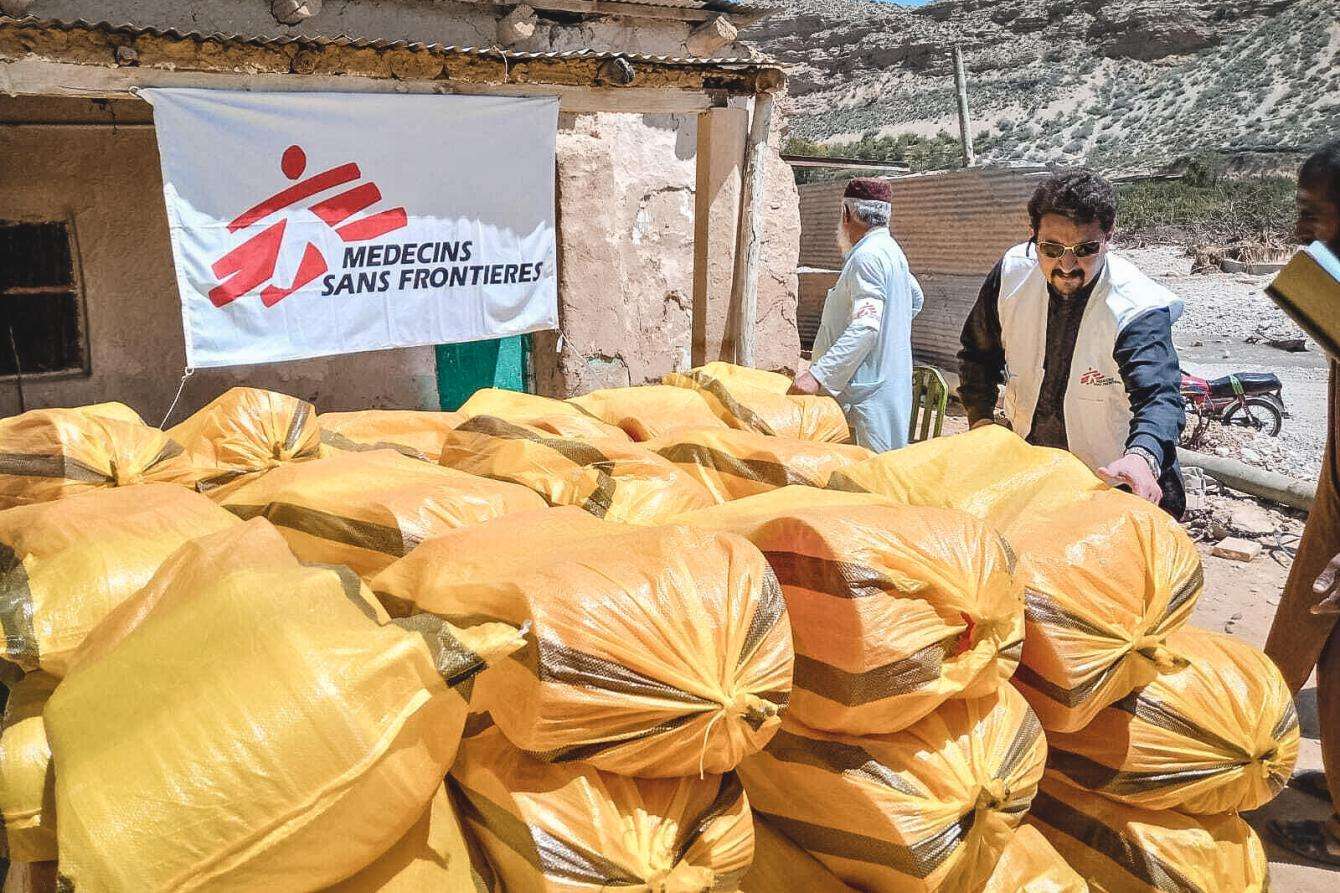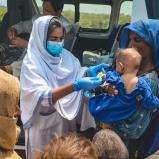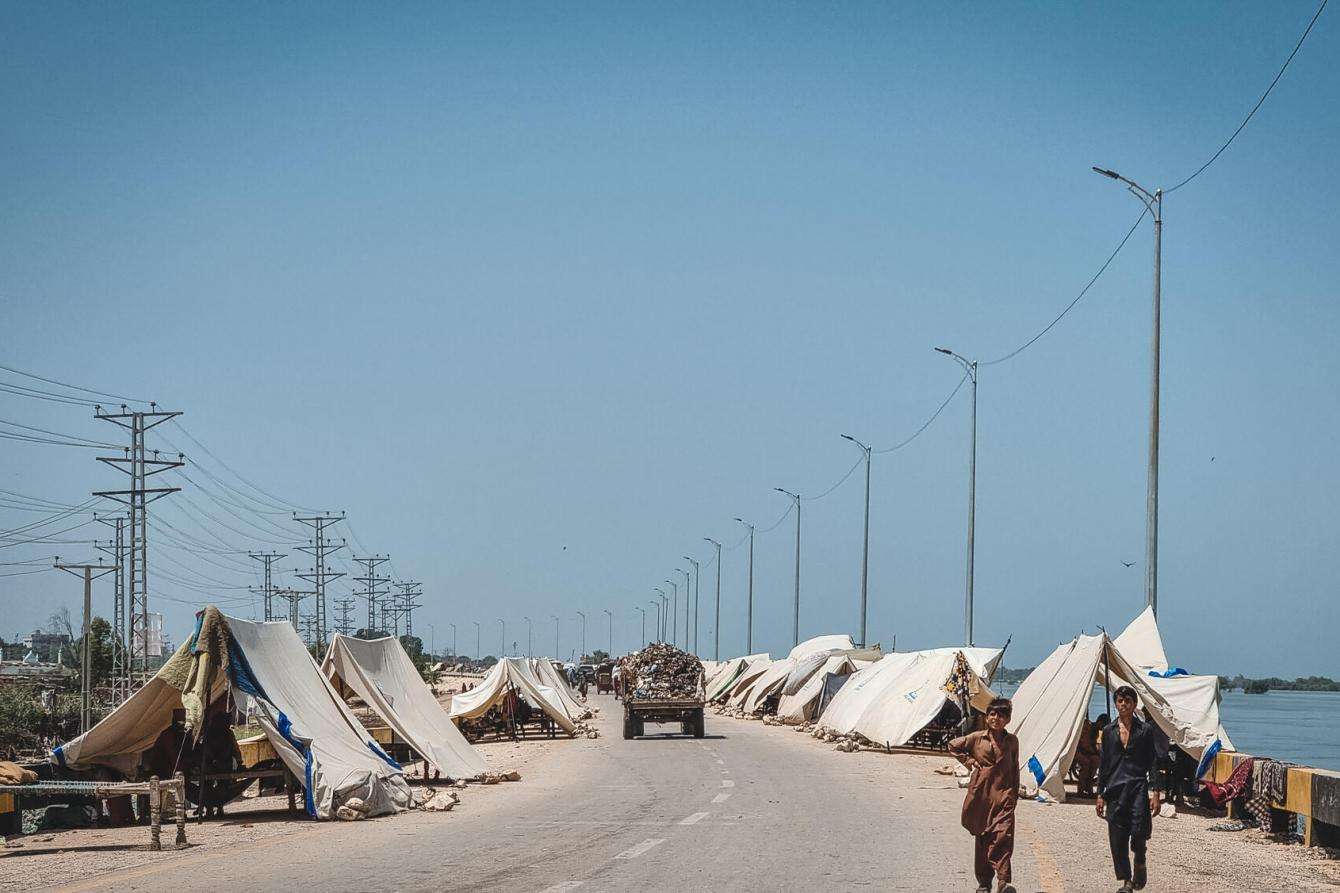At least 33 million people have been affected by recent flooding in Pakistan that has left one-third of the country underwater. More than 1,300 people died, including at least 458 children, and more than 12,700 people were injured. The Government of Pakistan declared a national emergency on August 26, appealing for international aid. Government officials, humanitarian organizations, and volunteers all face enormous challenges accessing people in need and an urgent scale-up of the humanitarian response is needed.
MSF has been present in Pakistan since 1986 and has responded to several natural disasters in the country, including flooding in Dadu, Sindh province, in 2020. MSF currently runs seven programs in Pakistan employing more than 1,800 staff—about 97 percent of whom are locally hired.
Many of MSF’s staff members have been directly affected by this most recent disaster, including colleagues whose homes have been flooded. Despite this, our teams across the country have adapted their activities to respond to the most pressing needs of people affected by the floods, including many who have been displaced. We are providing medical and mental health care, safe drinking water, and non-food items, including hygiene kits and mosquito nets.
Access to clean water and shelter are the most pressing needs. In the aftermath of floods, there is an increased risk of waterborne diseases such as diarrhea, cholera, dengue, malaria, and skin and eye infections. Across Pakistan, flood water has contaminated water tanks and boreholes. Most of those who lost their homes are now living in tents on the banks of overflowing canals and rivers—the floodwater they may drink is contaminated.
Toilets have been destroyed or are filled with mud, making them unusable. Pakistani health officials have reported waterborne diseases in areas where thousands of people are affected by the disaster. To prevent a widespread outbreak of disease, safe water must be provided, and the sanitation situation improved.

MSF's response
Balochistan
Eight severe monsoons in southwestern Pakistan’s Balochistan province damaged 61,718 houses, killed 145,936 livestock, and badly affected 190,000 acres of agriculture land. Three MSF teams are providing emergency care to flood-affected communities in the province.
MSF teams based in Dera Murad Jamali in the east of the province have provided outpatient consultations to 2,575 people with fevers, skin diseases, diarrhea, and skin and eye infections through two mobile clinics. They have also distributed more than 400 non-food items (NFI) kits—including hygiene supplies and mosquito nets—and provided clean drinking water. MSF’s teams here also conduct health promotion and refer people requiring specialized care to MSF’s facility in the District Headquarters hospital.
In the city of Chaman—several hundred miles northeast of Dera Murad Jamali—MSF teams have provided 450 consultations and distributed 130 NFI kits in the towns of Killi Sui Karez and Killi Taikadar.
In Quetta, the largest city in Balochistan, we’ve provided more than 800 consultations for patients with respiratory infections and acute watery diarrhea. MSF has also distributed about 22,190 gallons of water in the area and distributed 385 NFIs to more than 300 families. Many of these people are refugees from Afghanistan. MSF continues to assess the needs and will scale up support as needed.
In eastern Balochistan, MSF has begun supplying water and mobile clinics in Manjhoo Shori, Usta Muhammad, Sohbatpur, and neighboring areas that were most affected by the floods. Our teams will also distribute hygiene items such as soap.

Pakistan floods: “So many people needed help”
View the timelineSindh province
Fifty million people live in southeastern Pakistan’s Sindh province, which was worst affected by the floods, seeing at least four-and-a-half times more rain than the 30-year average, according to Pakistan’s meteorological office. The region produces half of the country’s food, but 90 percent of its crops were ruined causing fears of severe food shortages.
Entire villages were swept away, roads and powerlines were damaged, and railways are blocked. Water levels in Manchar Lake—the largest freshwater lake in the country—have risen dangerously high. On September 3, officials breached the Lake to prevent further ruptures after it flooded two rural towns.
Near Sukkur city, MSF teams have provided safe drinking water and basic NFIs, including plastic sheets for families without shelter. MSF is currently establishing a base in Sukkur and will deliver more aid to the area in the coming days.
An MSF team has launched a mobile clinic Dadu, providing primary medical care to people affected by the floods. The team treats 120 to 150 patients daily for skin diseases, diarrhea, and psychological distress. MSF is concerned about a potential rise in cases of acute watery diarrhea in the coming weeks.

Khyber Pakhtunkhwa and South Punjab provinces
A devastating flood that started in Kalam, in northwestern Pakistan’s Khyber Pakhtunkhwa province, tore through many districts, taking with it thousands of houses and hundreds of livestock. According to local authorities, 50,000 people were rescued from the cities of Nowshera, Charsadda, and Dera Ismail Khan and moved to relief camps and other safe locations.
MSF plans to launch activities in Nowshera and Charsada. The waterbeds in these cities are contaminated and there is a high risk of water-borne diseases. Stagnant water increases the risk of dengue and malaria. MSF will focus on providing primary health services, hygiene kits, health promotion activities and mosquito nets, while supporting the health authorities with the surveillance and preparedness to potential outbreaks.
MSF also plans to launch activities in South Punjab province.
MSF teams around the country continue to assess needs and remain ready to adapt their response and scale up activates as needed.




